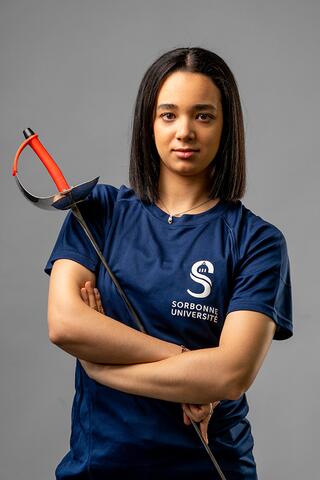
Zohra Kehli
High-level fencer and History student
Fencing is a sport of speed. You have to know how to make the right choices and, above all, never doubt.
African women's sabre champion in 2022, Zohra Nora Kehli chose to study history with the aim of pursuing a career in international relations. At the age of 22, the Franco-Algerian fencer, who combines top-level sport with her studies and a political mandate, is sabre-running towards the next Olympic Games in Paris.
How did your passion for your sport come about?
I wanted to be a wrestler, but at the age of four I discovered fencing at an introductory day in Montreuil. Since then, I've never wanted to stop. I started with foil, the weapon we give to all beginners. Then I joined the Cercle d'Escrime de Vincennes where, at the age of seven, I started my first competitions, trained by Guillaume Galvez, a fencing master who also teaches at Sorbonne University. I chose the sabre, a lesser-known weapon than the foil, but one that demands greater speed and aggressiveness.
You are currently in your third year of a History degree. What are your career plans?
After my baccalauréat in sciences, I chose to do a degree in History. It's a discipline that I feel is essential for building a solid foundation of knowledge about our past. And it's all the more important for me as I want to go on to study for a master's degree in political science or international relations.
How do you reconcile your studies with top-level sport?
I devote most of my time to fencing. After a period with Racing Club de Paris, in 2020 I joined the Christian Bauer Academy in Orléans, which brings together the world's top 20 fencers, coached by the best international fencing master. I train from 9 a.m. to 3 p.m., five days a week, not counting weekend competitions.
All the skills I've acquired through top-level sport now help me in my studies. I study for two or three hours every day, as well as at weekends when I'm not competing, the lessons given to me by the other students. It's a balancing act. Organization is essential.
How does Sorbonne Université support you in this dual project?
The high-level sports scheme enables me to follow up on both academic and sporting matters. I'm exempt from class attendance requirements. My administrative status makes it easier for me to raise awareness of my situation among the teaching staff, and I have the support of a sports advisor at the university. In addition, I benefit from the Passport for the Olympics scholarship program supported by Crédit Agricole d'Ile-de-France Mécénat and the Sorbonne University Foundation, which provides financial assistance for my project.
What do the Paris Olympics mean to you?
It's a home revenge because I tested positive for Covid-19 the day before the Tokyo Olympics. Even if, for fencing, the Olympics are an easier competition than the World Cups and Grand Prix that punctuate the year, it's still the Olympics! The stress is tenfold.
When you get to a certain stage, you all want a medal. I don't know what color mine will be, but I'm hoping to win one! After that, the idea is not to look at the podium, but to concentrate match after match to win.
How are you preparing for this?
We've already started to step up our training, but from September onwards we'll be doubling our efforts, especially in terms of mental preparation. When I was preparing for the Tokyo Games, I saw that our behavior could change: we're more aggressive, more anxious. Mental preparation is very important. Fencing is a sport of speed. You have to know how to make the right choices and, above all, not have any doubts. The mind is decisive in a match.
Do you have a ritual before each competition?
It's a routine before every training session or competition: I sit down, try to release all the pressure and say to myself: "Have fun, Zohra!
What is your most vivid memory of a competition?
I have two, one bad and one good. The first is not being able to take part in the Tokyo Olympics because I tested positive for Covid-19. The second is the pride of having been crowned double African champion last year. A title that was particularly close to my heart.
In June 2020, you were elected municipal councillor in charge of early childhood in the town of Bagnolet. How do you manage to do it all?
Every day, I set myself a little challenge; this is a big one, but I'll see it through! I felt that not enough young people were running for municipal office, so I thought: why not me? I was campaigning to promote fencing in working-class neighborhoods, and found myself embroiled in a political campaign where I was elected. This mandate, which runs until 2026, is a very enriching experience. Early childhood isn't just about opening day-nursery places, it's also about the many projects I'm involved in with other delegations, such as disability and sport.
Photographie © François Le Guen
Notable Achievements:
- African junior team vice-champion in Algiers in 2019.
- Team bronze medal at the 2019 African Senior Fencing Championships in Bamako.
- African junior women's sabre champion, individual and team, Ghana, 2020.
- French university champion in team and 3rd in individual in 2022.
